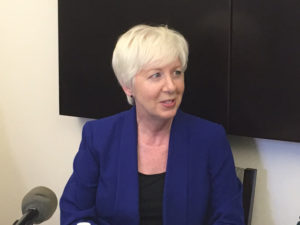 By Steve Brawner
By Steve Brawner
© 2016 by Steve Brawner Communications, Inc.
The quickest route to saving the state millions of dollars may be the $119,000 extra it’s spending on one of its new employees.
That’s how much more money new Department of Human Services Director Cindy Gillespie is earning than her predecessor. He was making $161,038. Gov. Asa Hutchinson, with the support of the Legislature, bumped her salary to $280,000.
This was done because DHS is an important agency, and Gillespie has an impressive resume. The department spends $8 billion of your money and employs 7,000 people. It serves 1.2 million Arkansans through a variety of programs, many of which provide expensive services literally dealing with life and death: Medicaid, which serves disabled people and senior citizens living in nursing homes; the private option, which provides health insurance to lower income Arkansans; and the state’s foster care system, which serves more than 4,900 children. Gillespie was one of Mitt Romney’s health care advisors when he was governor of Massachusetts and, before that, she helped Romney rescue the financially troubled Salt Lake City Winter Olympics held in 2002.
When Gillespie started leading DHS about three months ago, her first act was to determine how big a mess the department was. She found during a 60-day review that its 10 divisions operate independently. Because of that, in many areas the department has had no central vision, while the director hasn’t been able to manage things properly or even to easily find out what’s going on. Because 10 divisions are buying things, the department hasn’t coordinated purchases or taken advantage of its economies of scale to get better deals with vendors. Each division is in charge of its own technology, meaning the department has hundreds of systems, with most tech duties outsourced to vendors.
Gillespie told legislators this week that the department is canceling contracts worth $174 million over the next seven years. Some of those may serve legitimate needs, and DHS may return to those vendors. But a change has to occur because in many cases, the state has been renewing contracts year after year without really determining if they were still needed and if they were written to serve the state’s best interest.
The reason it hasn’t changed before? “The easy path is just to keep it going,” she said.
Moreover, Gillespie has taken over an agency where morale is not great. The department’s turnover rate is 22 percent, which means, at any given time, more than one in five positions is in the process of being filled or is being staffed by someone new. That’s especially bad because half of the department’s employees are directly involved in patient care. Because each division manages its own human resources, there’s no department-wide strategy for hiring people and advancing them along career pathways. Sometimes there are problems with the job duties, such as the foster care caseworker who spends 30 hours a month making copies instead of helping children. Pay is lower than it should be – though, let’s be honest, state employees have benefits such as retirement that few others enjoy these days.
So now Gillespie is trying to fix the problems. As of July 1, about four months after she started the job, DHS will be reorganized. Instead of the divisions each doing their own thing, seven shared offices will each handle a major responsibility for the entire department – one to hire, one to buy things, one to handle technology, etc. A new finance office has already committed to find $25 million in savings this first year. When it’s done, she expects DHS to hire fewer people but make them better at their jobs and pay them more.
When the state hired Gillespie, it invested a little money in someone who’s going to run government more efficiently, like a business. Some people are really good at doing really consequential things, and sometimes, you get what you pay for.
That reality doesn’t always make sense, like when the state’s highest paid employee is a college football coach who makes $4 million a year. But it is the world we live in, which is why someone who can reorganize the state’s life-and-death department in four months should make at least 7 percent of that amount.
Related: What exactly is the private option?

